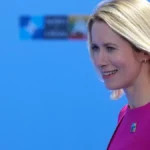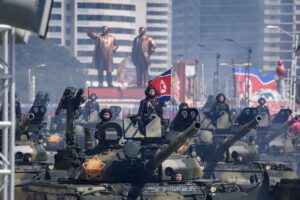With conflicts breaking out in the region of Central Asia, one unintended consequence of Russia’s invasion of Ukraine is the destabilisation of post-Soviet space.
At the end of September, the Secretary of the Security Council of the Republic of Kyrgyzstan, Marat Imankulov, announced that the country’s leadership had initiated the exclusion of neighbouring Tajikistan from the Collective Security Treaty Organisation (CSTO), a military alliance that includes Russia, Armenia, Belarus and Kazakhstan in addition to the two countries.

The move comes after several weeks of bloody border conflicts between Kyrgyzstan and Tajikistan. Of course, for Europeans, these hostilities are overshadowed by the war in Ukraine; however, when I saw a video showing the aftermath of the shelling of the regional centre of Batkent in Kyrgyzstan — a cloud of smoke over residential areas — I was immediately reminded of how the same cloud rose over homes after the rocket attack on Lviv.
Russia’s Dwindling Influence
At the same time, the statement by the Kyrgyz leadership demonstrated the ephemeral nature of CSTO solidarity — during Armenia’s recent conflict with Azerbaijan, the organisation effectively denied Yerevan any real assistance, and Tajikistan’s conflict with Kyrgyzstan has only led to an expression of concern, signifying Russia’s reduced level of influence in the region.
An obvious demonstration of this trend took place at the recent Shanghai Cooperation Organisation summit in Samarkand, Uzbekistan. Russian President Vladimir Putin went to this meeting hoping to demonstrate that there was no international isolation of Russia and that he himself was still one of the world’s leaders.
However, it became clear in Samarkand that the leaders of the Central Asian countries — i.e. the former republics of the Soviet Union — had much more respect and hopes not for Putin but for another participant in the summit — Chinese President Xi Jinping.
Moreover, the Chinese head, who has been wary of international travel since the outbreak of the COVID pandemic, also visited the Kazakh capital Astana before Samarkand. During those talks, he told Kazakh President Kassym-Zhomart Tokayev that China supports his country’s territorial integrity and sovereignty and opposes interference in Kazakhstan’s internal affairs.
Observers saw these words by the PRC chairman as a signal to the Kremlin: as is well known, doubts about Kazakhstan’s territorial integrity are mainly expressed by Russian journalists and bloggers and even politicians.
A recent example is a post by former Russian President and Deputy Chairman of the country’s Security Council Dmitry Medvedev on the social network ‘VKontakte‘. In it, Medvedev spoke of Kazakhstan’s intention to ‘punish’ Kazakhstan for insufficient support for Russian policy.
The post disappeared just minutes after publication, with Medvedev’s staff reporting that his website had been ‘hacked’. However, the appearance of such a post could also be a clear signal to Kazakhstan’s leadership.
Historical Divisions Imposed by Russia
Modern Central Asia consists of five states that appeared on the political map of the world after the collapse of the Soviet Union.
The borders between these states emerged not as a result of historical processes but in the course of the so-called ‘national-territorial demarcation of the Central Asian republics’ carried out by the Bolsheviks. Stalin demarcated the borders of the future union republics in such a way as to ensure conflicts between them and to emphasise the leading role of the ‘big brother.’
Add these historically careless borders to the semi-autonomous ‘states within states’ — Karakalpakstan as part of Uzbekistan and Nagorno-Badakhshan as part of Tajikistan — and the region’s potential for conflict becomes obvious.
At the same time, real processes of democratic power transition have so far only taken place in one Central Asian country — small Kyrgyzstan. But even there the governmental style is a democracy of revolutions and rebellions tend to precede elections.
Feudal Lords, Not Heads of State
In all other countries, autocratic regimes are in power. Kazakhstan’s President Kassym-Yomart Tokayev took power from his predecessor Nursultan Nazarbayev. Uzbekistan’s President Shavkat Mirziyoyev came to power after decades of totalitarian rule by his late predecessor Islam Karimov.
Tajikistan’s President Emomali Rachmon came to power following a civil war in the early 1990s; there is a crackdown on the opposition and the president is preparing to transfer power to his son. And in Turkmenistan, such a transfer of power from father to son has already taken place.
It is only fashionable to wonder that three decades ago, in all five countries, the first persons were not feudal lords but the first secretaries of the Central Committee of the republican communist parties. By the way, even then, Kyrgyzstan was the only one of the republics where the first secretary of the party’s Central Committee could not win the presidential election in the Kyrgyz SSR.
Such an authoritarian arrangement facilitated Russian influence, of course. For each country, Moscow had its own ‘recipe’ for control. In the first decades of its independence, Kazakhstan was forced to reckon with Moscow only because it could fear an internal explosion: almost half of its population being Russian is a good argument for maintaining a special relationship with Russia.
The economies of Kyrgyzstan, Tajikistan and Uzbekistan, were critically dependent on the work of millions of guest workers on construction sites in Russia. Finally, virtually isolated from the outside world, Turkmenistan could only rely on Russia to transport its natural gas deposits: when Ashgabat tried to bet on China, this only led to an economic crisis and new humiliating agreements with Gazprom.
However, Russia’s attack on Ukraine changed the situation almost beyond recognition. First, there was fear — fear that after a war with the former ‘republic’ of the Soviet Union, the Kremlin would turn its attention to Central Asia. This fear is most prevalent among representatives of Kazakhstan’s political and business elite. It is no coincidence that during the talks in Samarkand, Kazakhstan’s President Kassym-Zhomart Tokayev, according to many sources, also talked to President Putin about the need to end the war.
The leaders of Kyrgyzstan, Uzbekistan and Tajikistan understand that the Russian economy is shrinking — meaning that many compatriots will have to return home, and new ‘guest workers’ will no longer go to Russia. This could lead to a social explosion, the effects of which Russia will not be able to protect itself. On the other hand, Moscow may call former ‘guest workers’ to war, meaning they will return home with no social prospects and military experience.
Russia’s role in regional security is a separate issue. Russian troops — or the possibility of their appearance — are unlikely to scare off ‘armed politicians’ in Afghanistan in the future if they want to turn their attention to neighbouring countries. But in this case, we are talking not only about the Taliban but also about the ethnic Tajik or ethnic Uzbek leaders of Afghanistan, who may have their own ideas about the development of Uzbekistan and Tajikistan.
Let us not forget Turkmenistan, whose leadership understands that reducing Russia’s energy role creates entirely new opportunities for the country. But how to get Turkmen gas to those who need it?
Losing More Than Face
In this situation, the strengthening of China’s role is only natural. One could say that the Samarkand summit saw the informal ‘coronation’ of Xi Jinping as the region’s leader. And Vladimir Putin was left facing a difficult choice: to be an exasperated witness to this triumph or to join his Central Asian counterparts in recognising Chinese leadership.
The role of other global players will also increase. Turkey, which has pretended to lead the Turkic world since the days of President Suleiman Demirel, now has a new opportunity as Kazakhstan, Kyrgyzstan, Uzbekistan and Turkmenistan are Turkic states. Tajikistan is close to Iran, of course, but President Rahmon’s model of power is secular authoritarianism. But today we can all see how fast the region is changing. So I would not say with conviction that there is no place for Iran in this struggle for Central Asia.
Russia, which is rapidly losing both its positions and regional ties, will be left struggling to find a place in this new configuration. It is clear that this vacuum will not only be filled by China as the United States and European Union will have to understand that Central Asia is no longer a ‘soft underbelly’ of Russia but a region of intense geopolitical rivalry. More worryingly, the instability in the region could blow up the whole of Asia, just as the war in Ukraine has undermined stability in Europe.
Source: Visegrad















